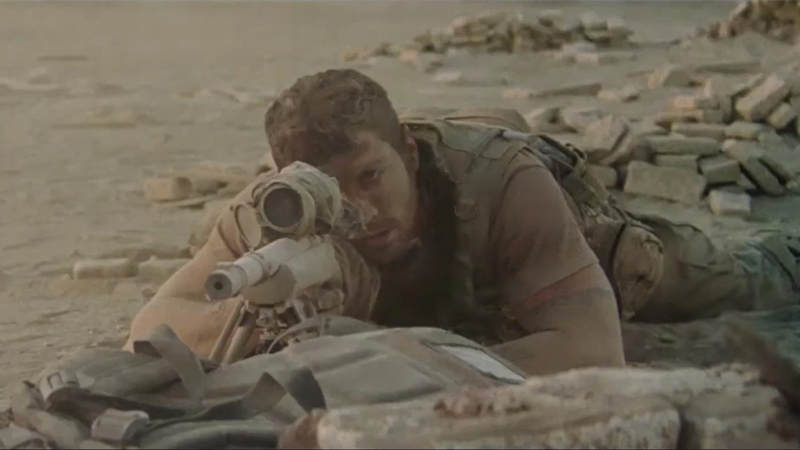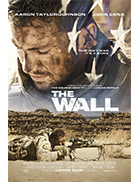The Wall
|  Not to be confused with either Yimou Zhang’s disappointing U.S.-Chinese fantasy starring Matt Damon or the inane edifice the current U.S. president is still insisting will be built along the border with Mexico, Doug Liman’s The Wall is a taut, grim, hard-edge war thriller that finds two American soldiers pinned down by a lethal sniper in the middle of the Iraqi desert. Despite being set in an open expanse in which the horizon blurs into the sky, it is a classical confined-space drama, quite the antithesis of Liman’s most recent directorial efforts, which include the sci-fi/war mashup Edge of Tomorrow (2014), the Valerie Plame docudrama Fair Game (2010), and the teleportation bomb Jumper (2008). The Wall is set in 2007, after the Iraq War has technically ended and rebuilding has begun. However, at the heart of the story is the fact that wars aren’t always over when the powers-that-be declare them to be so. Aaron Taylor-Johnson (Kick-Ass, Noctural Animals) and wrestling superstar John Cena star as Isaac and Matthews, two U.S. soldiers who have been dispatched to surveil a construction site where an oil pipeline is being built after the construction crew and a security detail were killed by a sniper. Isaac and Matthews have remained hidden, watching the site from a vantage point high on a nearby hill for more than 18 hours. Convinced that the sniper has left, Matthews walks down for a closer inspection, at which point the sniper makes himself known. Soon, the two soldiers are both wounded and scrambling for their lives, with Isaac taking refuge behind the crumbling, shoddily constructed mud wall of the title, which at one point was part of a school. The story takes an intriguing turn when Isaac finds himself in radio contact with the sniper (Laith Nakli), who calls himself Juba and wants to engage Isaac in personal conversation. Juba claims to be a teacher who lost everything when an American bomb hit his school, but his tendency toward deception and his almost supernatural marksmanship suggests that he may not be truthful. Isaac has no choice but to engage with him, as he is trapped behind the wall, bleeding, and lacking any tools for survival (including a means to call for reinforcements and water to keep himself hydrated in the scorching desert). With that setup, screenwriter Dwain Worrell (Iron Fist) develops an intriguing cat-and-mouse game in which Isaac tries to stay alive while Jubal remains a persistent, disembodied presence in his ear, taunting him with his very existence. Isaac never emerges as a particularly deep character, but he doesn’t need to be because we immediately connect with his pain, terror, and desperate desire to live. The dialogue between him and Jubal is wary and terse, often banal but just as often touching on various big-issue subjects, including the American presence in Iraq, religion and terrorism, and the true nature of war. Jubal is a vicious marksman who has essentially set a trap that keeps luring in more victims; the scenario is similar to the one in the second half of Stanley Kubrick’s Full Metal Jacket (1987), in which a sniper continually wounds a U.S. soldier as a means of drawing out his comrades so she can shoot them, too. Jubal’s plan is more elaborate, as it involves not just drawing people out into the open, but drawing more people to the kill-zone, which would seem to make him a one-note villain. Yet, the manner in which Nakli (24: Legacy) voices him and the tenor of his dialogue suggests a man of various moral shadings whose seemingly cruel actions have, at least in his mind, reasonable justification. This tricky moral quagmire unfolds against Liman’s intense use of space and the environment to heighten the film’s tension. Given that it is stuck in such limited confines, one would think that the film’s visuals would grow tiresome, even with a lean 80-minute runtime, but Liman and cinematographer Roman Vasyanov (Fury, Suicide Squad) keep them consistently engaging by mixing objectivity and subjectivity. Most of the time we are pinned down with Issac and Matthews, unsure of the sniper’s location and where danger lies, but then we cut away to the sniper’s scope, where we see exactly what he sees. The environment is crucial, and Liman makes us feel the intense heat and suffocating sense of enclosure, even under the open sky. Clouds of dust become protective sanctuaries, and the wall itself—so frail, yet so crucial—becomes a potent symbol of the thin line between life and death, a line with which the film never lets you feel entirely secure. Copyright © 2017 James Kendrick Thoughts? E-mail James Kendrick All images copyright © Amazon Studios / Roadshow Entertainment |
Overall Rating: 

 (3)
(3)


